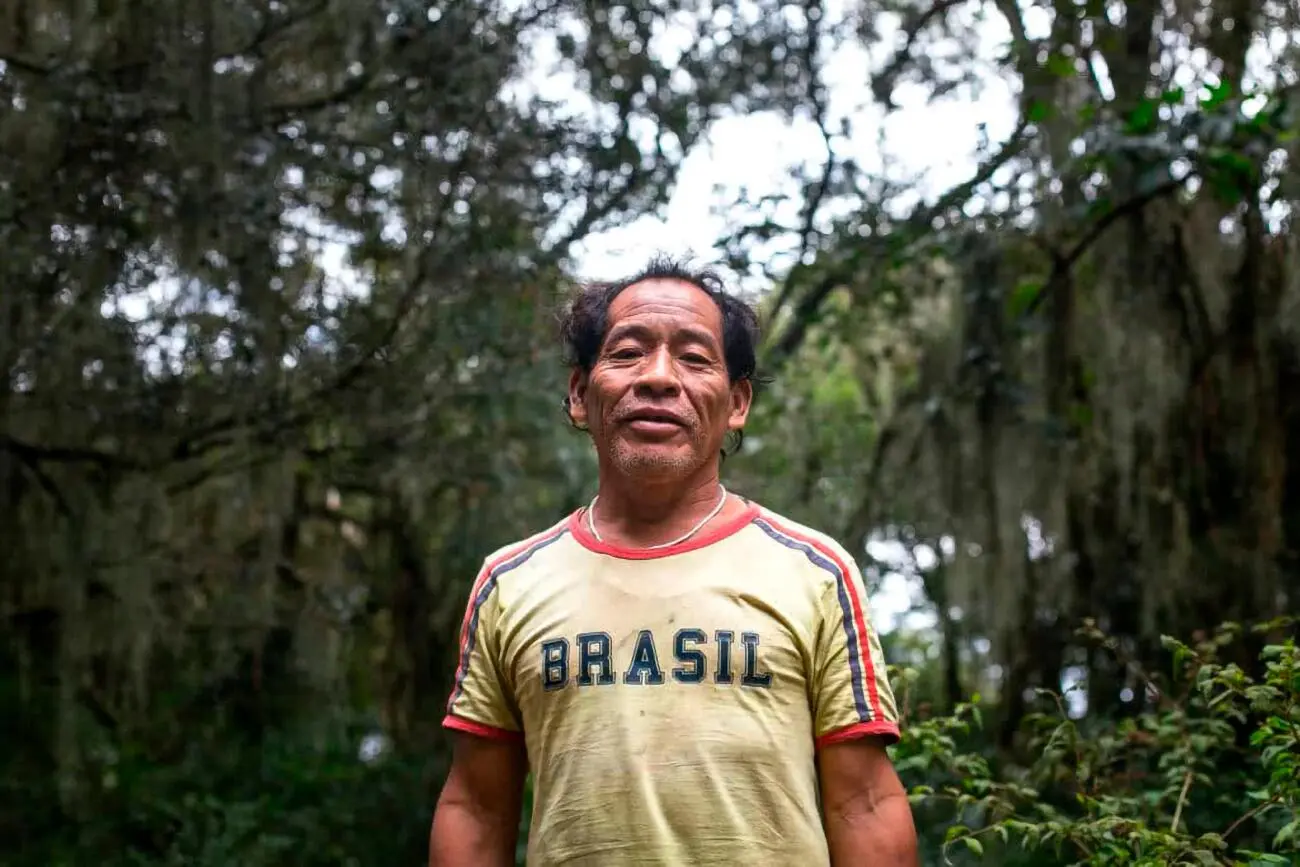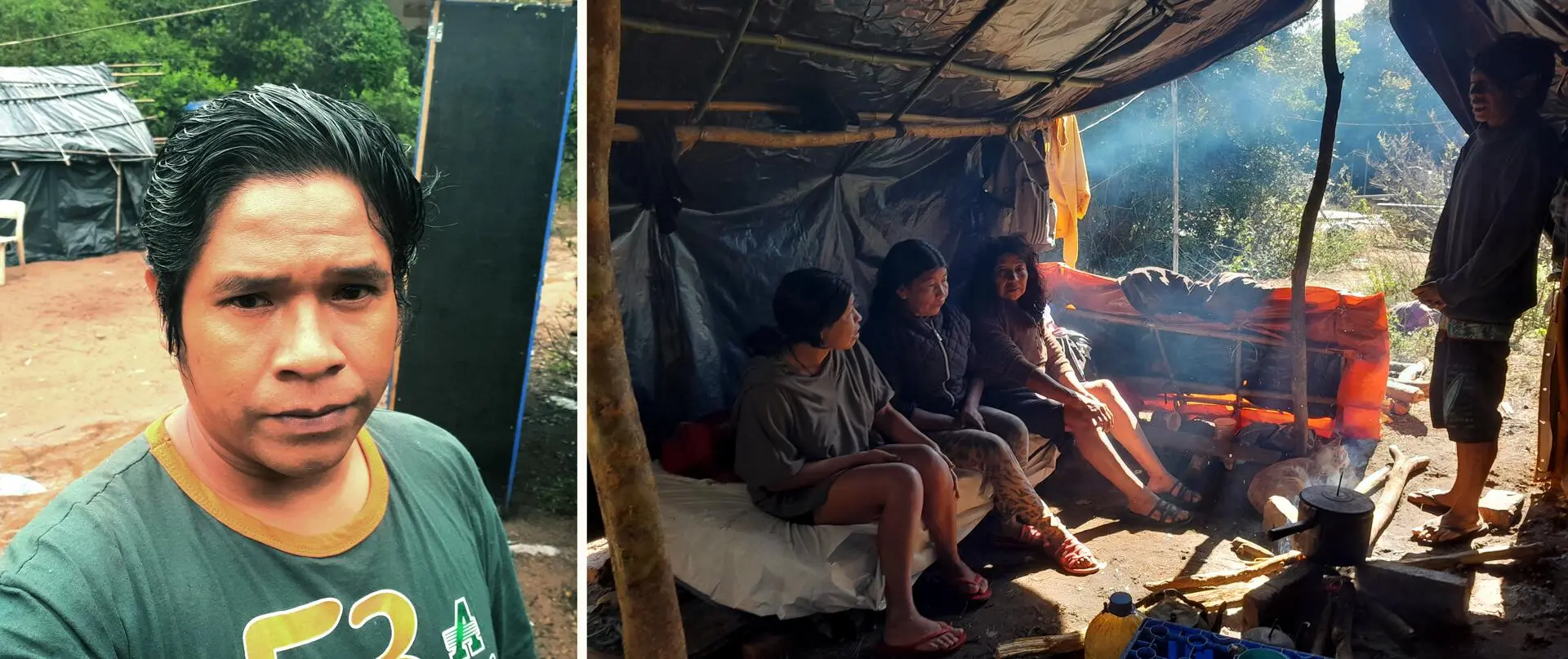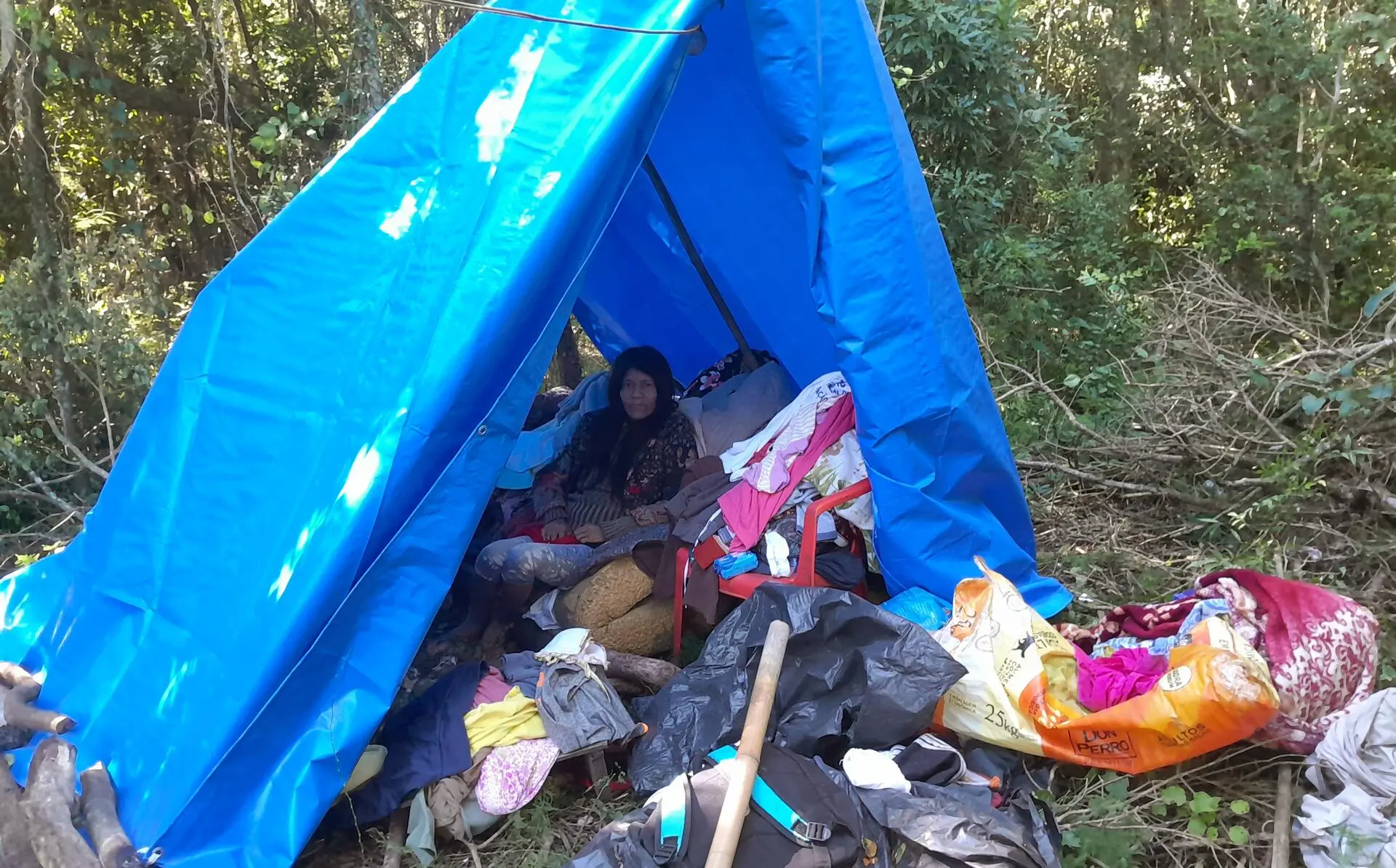We are Guarani Mbya people from Tekoa [Guarani for village] Yjere. Our village is about 18 miles from the center of Porto Alegre. We’ve lived here for six years. We lost everything in the flood.
We use the water from the Guaíba River where we live to fish, bathe, and wash our clothing and dishes. We use water from the well, a little well, to cook. But everything flooded. Right now we don’t have a well. The water began rising early in the morning [at the beginning of May]. It was a rainy day. We awoke to the loud noise of water hitting the wall. We were still in bed. Suddenly the water was everywhere inside our houses. We left in a hurry; we left everything behind. It was all swept downriver by the water.
There are 17 of us, five small children. When the water rose, we all left the village. We were able to take a few things, some blankets; some people took documents, food, and clothes. And we went to higher ground. We put up some plastic tents to stay in. And now we’re here. It’s been over 20 days. The water has gone down a bit. But it’s no longer possible to get into our houses. Everything was destroyed; the walls were destroyed.

Cacique Timóteo had never seen such heavy rain, but he says his ancestors had warned him this would happen. Photo: Pablo de Souza
In our village, the waters took the entire Prayer House. That was where we held our rituals from spring to autumn. A sacred place. The water rose more than three feet high; it reached the roof. It took the plants; it covered the Brazilian Cherry and Fig trees. It reached everything. Our house was entirely destroyed. The six houses in the village were destroyed. My people left everything behind.
We’re like an island. We can’t leave anywhere. Everything is in the middle of the water. Yy ombojere pa [surrounded by water, in Guarani].
Now we’ve lost our boat too, last Sunday. I [Pablo] wanted to go to the 24-hour ATM at the market to try to withdraw my wife’s Bolsa Família assistance funds and buy milk for my daughter, because we’d run out. It was getting close to evening; it was very windy. The engine wouldn’t start. I tried several times. All of a sudden, the wind pushed the boat, I lost my balance, and I fell in the river. The boat flipped over; it filled with water and sank very quickly. I nearly drowned but thank God I was able to swim along the shore, along the riverbank. Our boat still hasn’t been found. Now we don’t have a boat. Things are harder because we can’t even go into the city to go shopping, to work.
We had access to the river with our boat, through an area where they put cattle. We’re fighting them for our land. They wanted to build a high-end hotel there. But that project was blocked a while ago, because when they were doing landfill work, to start the project and build a condominium, they found Indigenous artifacts, like old clay utensils.
After the first flood, we went nearly a week without water; we kept collecting rainwater to drink. There was still a little food. The supporters [volunteers] came to help us soon after. They brought us five twin mattresses, blankets, water, and some tarps.
Then they also brought food; there are collectives that are helping. They brought basic staples, like beans, rice, pasta, oil, flour, and cornmeal. Now we’re cooking as is our custom, in the fire’s embers. We had a gas stove, but not anymore. We had a laundry sink to wash clothes in. Not anymore.
Help only reaches here by boat. These people have our most heartfelt thanks. We’ve received no help from the government so far. We researched forms of flood assistance. We found out that SOS Enchente [SOS Rio Grande do Sul] made a first payment to homeless and displaced people, but we won’t receive anything. We’ve received nothing from Funai [Brazil’s national Indigenous affairs agency]. We’ve even forgotten Funai exists.
Since early May we’ve been living in the tents we built. But we’re fine now. We preferred to stay rather than go to a shelter. We can’t leave this land. They want us to leave, for us to go away, but we’re going to stay.

Pablo de Souza (left) was preparing to become a teacher when the flood brought his relatives’ lives to a halt. Now, they’re all living in makeshift houses
We’ve been here six years. Our ancestors lived on this land. Spirituality, the ancestral spirits, showed us that a Guarani village is to be built in this place, on this land. We aren’t the ones who decide to go somewhere. We’re always praying, asking our God how life will go. And this was shown to our cacique [Timóteo], that we were to go to Ponta do Arado. Our ancestors lived here on this land, many years ago, before white people ever came to Brazil. That’s why we came here, to reside and make a village. When we arrived, everything over there was a neighborhood, Belém Novo. The cacique likes to tell this story. Talking about our history, our culture, and our way of life is very important to us.
This land isn’t demarcated yet; it’s in the process. In 2020, we sent a letter to Brasília about setting up a Funai working group to draft an anthropological report about our territory. A federal judge ordered it. The judge asked to have the group set up. But so far, it’s just us…
We took back our territory in 2018, at Ponta do Arado. After two years, a study was done on the land. Everything was ready for them to send in people to demarcate the land. COVID came and everything stopped. After that, there was the vote on the historic cut-off point in Brasília. Since that [bill] passed, no other Indigenous areas will be demarcated. They say anyone who wasn’t in the area prior to 1988 [the Constitution’s enactment] isn’t entitled to demarcation. I can’t say whether they’re going to override this historic cut-off point [Brazil’s Federal Supreme Court is considering a challenge to the constitutionality of the bill passed in Congress].
We can’t even plant here yet, because to plant crops, we have to have this land [they want the Indigenous Territory to be demarcated].
We’ve never seen rain as heavy as this. But our great-great-grandfather foretold that it would happen. Long after my great-great-grandfather, my grandfather spoke, I can see they spoke the truth.
They said we would see flooding, winds. All this here.
God Tupã protects. He told us to take care of his land. Yet the Nature spirit suffers greatly and now there will be a very big flood. First, they killed all our relatives, our little children, our great-great-grandparents, grandparents. Then they destroyed the land.
Do you think nothing will happen to white people? They’re going to suffer. White people don’t know. They think they’re rich and won’t suffer. Do they think only poor people, only Indians [sic] will suffer? No way! Everyone will suffer equally. Do they think the world’s richest farmer, the executive who has money, do they think they won’t experience hardship? They will too.
Everyone needs to think more about who protects this world. We have to respect Mother Nature. And the river as well. Native trees could be planted within at least a hundred yards of the river. You can’t live where the water can reach. Leave the riverbanks. We have to show our God that we’re respecting Nature, the water.
They’re rich people, the world’s richest, but their thinking will make everything even worse. They’re people who forget everything. “I’m white, richer! Are you poor? Then let everything die! Indians [sic] are making trouble on other people’s land…” IT’S OUR LAND! THAT’S WHY WE WON’T STOP MAKING TROUBLE.
We lived here before Pedro Álvares Cabral arrived. We want to preserve our way of life, always, as our ancestors lived. This land over the land, we know how to care for it. Non-Indigenous people have already made many mistakes, from the start. They removed many native trees, cut them all down, killed Birds, killed Bees, killed Palm Trees, native fruits. From the start, white people haven’t cared for Nature. They’ve just destroyed it. And now, 500 years later, there’s no longer any forest. Interest in doing nothing but making more money destroys everything. They just want to see more cities, apartments… White people don’t want to take care of Nature, of the water, of anything. We, Guarani, respect and love Nature because we grew up with the land and the forest. We treat them as relatives. The land is our life. White people will never preserve it. They’ll destroy it more and more. Perhaps they’ll understand my words.
We will stay here, making our village again, remaking everything. We’re going to plant corn, rice, beans, potatoes, so we won’t go hungry and won’t have to depend on non-Indigenous people. Now with the flood we’ve had some help, but we don’t know if it’ll always be like this. We don’t know what it will be like in the future. We might go hungry, and we could face tough situations. We want to be prepared. Make our village, plant our crops, so we can survive. The situation we live in doesn’t matter; we’ll always stay here.

The Guarani fashioned tents on the village’s high ground to flee the water. They chose not to leave the territory because they fear losing it forever. Photo: Pablo de Souza
Timóteo Karay Mirim de Oliveira was born in the municipality of Viamão, Rio Grande do Sul, in 1962. A Mbya Guarani, he is the cacique of Tekoa Yjere, where he has lived for six years. The Guarani have been trying to take back their ancestral territory at Ponta do Arado since 2018. In the region known as the Belém Novo neighborhood, along the shores of the Guaíba River, the Indigenous people are fighting for their territory in an area where the real estate industry wants to build a high-end project. Timóteo’s village, where 17 Indigenous people live, was completely flooded and its six houses totally submerged and destroyed.
Pablo Natalício de Souza, 37, wants to be a teacher and educator of Indigenous people. He was preparing to do this when the flood came and brought his relatives’ lives to a halt. In the village, at a makeshift school, he has been teaching some classes to children and adults, including Timóteo. Pablo is also deputy cacique.
Report and text: Timóteo Karay Mirim de Oliveira and Pablo Natalício de Souza
Editing: Malu Delgado and Talita Bedinelli
Photo Editor: Lela Beltrão
Fact-checker: Plínio Lopes
Proofreader (Portuguese): Valquíria Della Pozza
Spanish translation:
English translation:
Copyediting and finishing: Natália Chagas
Editorial workflow coordination: Viviane Zandonadi
Editor-in-chief: Talita Bedinelli
Editorial director: Eliane Brum





